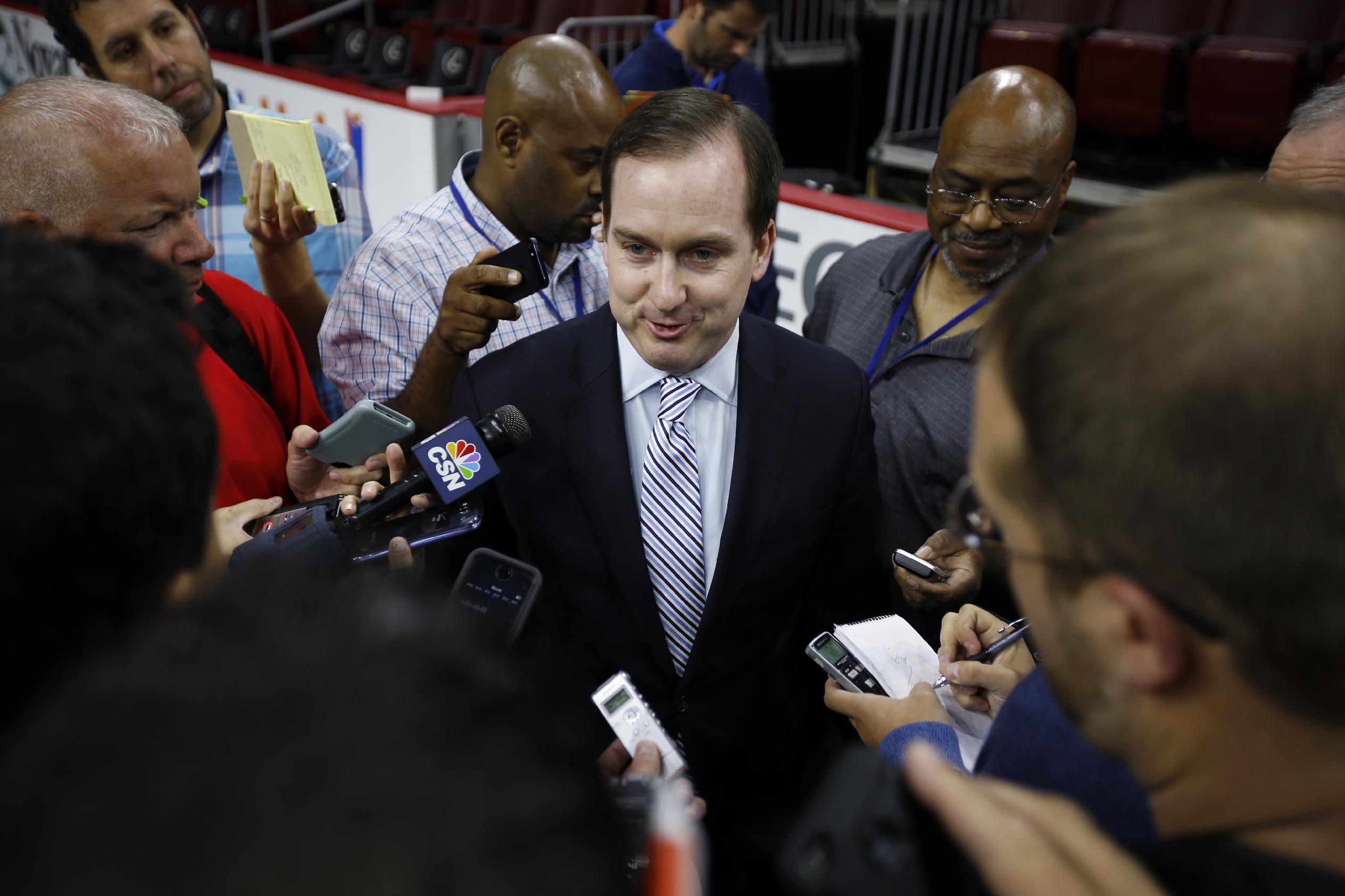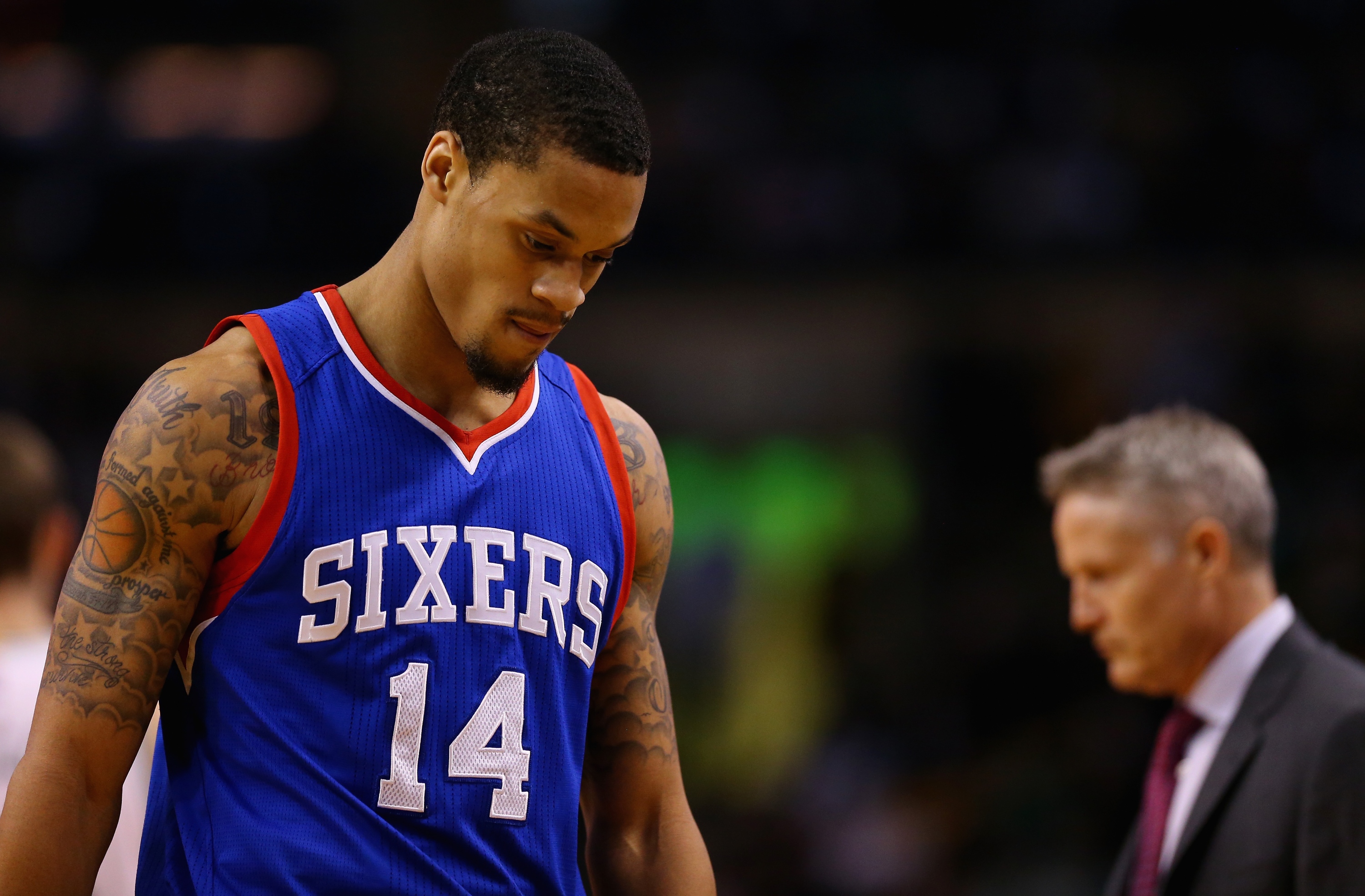Report: 76ers fined $3M for ‘not fully disclosing’ Holiday’s injury history before trade
After taking over the Philadelphia 76ers back in May of 2013, famously analytics-focused general manager Sam Hinkie’s first order of business was to trade away then-23-year-old All-Star point guard Jrue Holiday. Hinkie began taking a sledgehammer to the Sixers’ middling roster by shipping out Holiday in exchange for three future draft picks, headlined by 2013 No. 6 pick Nerlens Noel, who might’ve been the top overall selection if he wasn’t rehabilitating after surgery to repair the torn left ACL he suffered at Kentucky.
[Follow Dunks Don’t Lie on Tumblr: The best slams from all of basketball]
That one move laid the groundwork for and set the tone of a yearslong rebuilding process — The Process, The Process, forever The Process — that has seen Hinkie and company play an extreme version of the long game heavy on roster churn (43 players have seen the floor for the Sixers over the past two seasons) and light on wins (Philly’s gone a combined 37-127 in that span). The ongoing enterprise has yet to bear meaningful fruit, and according to a report from Keith Pompey of the Philadelphia Inquirer, the thus-far-unappetizing results have all come from a poison tree:
The 76ers were ordered to pay the New Orleans Pelicans $3 million by the NBA last season for not fully disclosing Jrue Holiday’s injury history before he was traded two years ago, according to two sources. […]
The sources said Holiday played with stress fractures in his lower right leg during his final season with the Sixers. However, the sources said, those injuries weren’t fully disclosed to the Pelicans.
Sixers general manager Sam Hinkie declined to comment, but a Sixers team source disputed the allegation.
“That’s not true,” the Sixers source said.
Holiday missed just 13 games over his four seasons in Philadelphia. He played in 78 contests and logged a career-high 2,926 minutes, the 10th-highest total in the league, in the 2012-13 season before being traded to New Orleans. He’s missed 90 games over the past two seasons, thanks in large part to struggles to get past right leg injuries.
A stress fracture ended his 2013-14 campaign in mid-January, after just 34 appearances. A stress “reaction” and subsequent complications cost him nearly three months of last season. Then-head coach Monty Williams expressed concern for Holiday’s future after the Pelicans were eliminated from the 2015 playoffs by the eventual NBA champion Golden State Warriors. From Brett Martel of The Associated Press:
“We’re going to do everything we can, work with his doctors in [Los Angeles] to try to figure out how we can get him back on the floor,” Williams said of Holiday while holding his end-of-season meeting with reporters on Tuesday. “No matter how you slice it, concern or frustration, the bottom line is I’m more saddened that he can’t play for him.”
Holiday missed half the regular season and was on minute restrictions after he returned shortly before the Pelicans’ first-round playoff loss to top-seeded Golden State. Recently, Holiday mentioned he may have a screw removed from his right shin, where he had surgery to repair a stress fracture more than a year ago.
“I can’t sit here and try to diminish that,” Williams said. “There is concern there just because he’s unsure and he hasn’t been able to play.”
Despite leading New Orleans back to the playoffs for the first time in four years, Williams was fired after the end of the season. He’ll be replaced by Warriors associate head coach Alvin Gentry.
While the 76ers haven’t exactly lit the world on fire since saying goodbye to Holiday, they do appear to have gotten the better of that particular exchange. After sitting out the entire ’13-’14 season, Noel averaged 9.9 points and 8.1 rebounds per game last season while finishing eighth in the NBA in blocks and 10th in steals, looking like the defensive game-changer many expected.
Hinkie also flipped the 2014 first-round pick he received from New Orleans, which landed the draft rights to point guard Elfrid Payton at No. 10 overall, to the Orlando Magic in exchange for the rights to 2014’s No. 12 pick, Croatian forward Dario Saric, plus a protected 2015 second-rounder and a future first-round selection. Those moves have yet to translate into immediate returns — Saric remains in Europe, and Hinkie used the 2015 second-rounder on Spanish center Guillermo Hernangomez, whom he then flipped to the New York Knicks for a pair of future second-round choices — but they remain a theoretical source of future dividends received in exchange for a player whose physical condition was evidently worse than the 76ers let on.
While the Sixers dispute the charge, the fact that the NBA levied the $3 million penalty indicates that league officials believe it had merit. That indicates to one admittedly somewhat biased observer — Oleh Kosel of Pelicans blog The Bird Writes — that Philly’s punishment should’ve been considerably more severe:
What Philadelphia did rates right up there with the worst infractions in the history of the NBA, yet it seems like the penalty does not fit the crime. Were this incident to have been tried before a court of law, the outcome would have probably been much different.
In contract law, there are 3 types of misrepresentation. The most serious is fraudulent misrepresentation whereby a party purposefully deceives another about an important detail of a transaction. In circumstances regarding bad faith (such as here), the immediate remedy is recission: rewinding the events and placing all parties in a position they were prior to the contract.
Thus, were this case brought before a civil court, the Pelicans would have likely been awarded Nerlens Noel and all the assets the Sixers acquired in trading Elfrid Payton to the Magic (Dario Saric, 2 future second round draft picks from the Knicks (for trading Guillermo Hernangomez to New York — the 2015 second round pick that was from Orlando) and most likely a 2017 first round pick.) Naturally, the Sixers would get Jrue back.
NBA matters aren’t governed by courts of law, of course, but rather by the constitution and bylaws to which all 30 member teams have agreed. That’s why Donald Sterling’s argument that the NBA was censoring him and violating his right to free speech was ultimately unable to prevent him from losing the Los Angeles Clippers. Since the NBA has already reportedly handed down the Sixers’ sanction — and since a reasonable argument can be made that any injury concerns with Holiday should’ve come up in the Pelicans’ pre-trade physical — it seems unlikely New Orleans will get anything like the restitution Kosel prescribes.
That said, though, it wouldn’t at all be shocking to see Philly pay a real price for such bad-faith negotiation.
The National Basketball Players Association plans to investigate the Sixers’ dealings to see if Hinkie and company have been willfully violating the collective bargaining agreement between teams and players, a move that suggests — as our own Eric Freeman wrote — that “the Sixers have confounded expectations of team-building so deeply that players’ representatives do not trust them.”
In fact, Sports Illustrated’s Jake Fischer reported that “multiple agents told SI.com they prevented players from working out for the Sixers during this year’s pre-draft process.” That seems to be a direct rebuke of Philly’s preference toward pushing second-round picks, undrafted free agents, D-League players and international prospects — a.k.a. nearly all of the 76ers’ talent base — into signing three- and four-year deals at or near the minimum salary, with the latter seasons unguaranteed.
Essentially, Hinkie’s using the players’ (and agents’) lack of leverage to get as much cost certainty as he can. If the player hits, a la Chandler Parsons, Philly keeps him around as long as possible at a bargain rate. If he misses or suffers a severe injury, the Sixers walk away quickly at minimal expense.
“With players we think have a big upside, we will only do three- or four-year deals,” Dallas Mavericks owner Mark Cuban told Grantland’s Zach Lowe two summers back. “If their agents don’t like it, we let them go overseas.”
You might remember K.J. McDaniels refusing to play ball after Hinkie tapped him with the second pick in the second round of the 2014 NBA draft. The Clemson swingman and his agent, Mark Bartelstein, “wouldn’t accept the 76ers’ structure of two guaranteed contract seasons that included two non-guaranteed seasons in years three and four of the deal,” as Yahoo Sports NBA columnist Adrian Wojnarowski first reported. Instead, McDaniels opted for a one-year, non-guaranteed contract that allowed him to enter restricted free agency after a season.
After McDaniels impressed with his athleticism, defensive work and energetic dunking — and after K.J.’s mom loudly lambasted The Process — Hinkie sent him to former boss Daryl Morey of the Houston Rockets in exchange for point guard Isaiah Canaan and a second-round pick. He played just 33 minutes after the trade; what exactly his RFA market looks like after months in the deep freeze remains unclear. (Morey’s reportedly interested in keeping him around.)
Even if the Sixers’ tactics aren’t illegal, then — the agents with whom Fischer spoke don’t seem to think much will come of the NBPA’s investigation — it very much remains to be seen whether the bad blood Hinkie seems to be engendering will wind up coming back to bite him. From Jake Pavorsky of Sixers blog Liberty Ballers:
The problem is that Sam Hinkie has genuinely pissed off a lot of people during his short tenure in Philadelphia, and people are willing to start leaking stuff to the press if that means throwing him under the bus. This is not the first time he’s been accused of devious tactics, and frankly, it seems like the issues might start catching up.
These negative reports keep continue to pile on top of each other, and are seemingly going to hurt his ability to conduct business going forward. For the most part, everything he has done seems to be within NBA rules, but you can only tip-toe the lines of legality and treat people like robots instead of humans for so long until teams and agents no longer want to deal with you.
If Hinkie continues pursuing this path and other decision-makers start refusing to play his brand of ball, that could wind up being a far more significant penalty than $3 million and some bad press. We won’t know just how significant, however, until Philly actually starts to get serious about winning, entering the running for top-shelf free agents or targeting stars via trade.
We could be here a while, y’all.
– – – – – – –
Dan Devine is an editor for Ball Don’t Lie on Yahoo Sports. Have a tip? Email him at [email protected] or follow him on Twitter!
Stay connected with Ball Don’t Lie on Twitter @YahooBDL, “Like” BDL on Facebook and follow Dunks Don’t Lie on Tumblr for year-round NBA talk, jokes and more.

